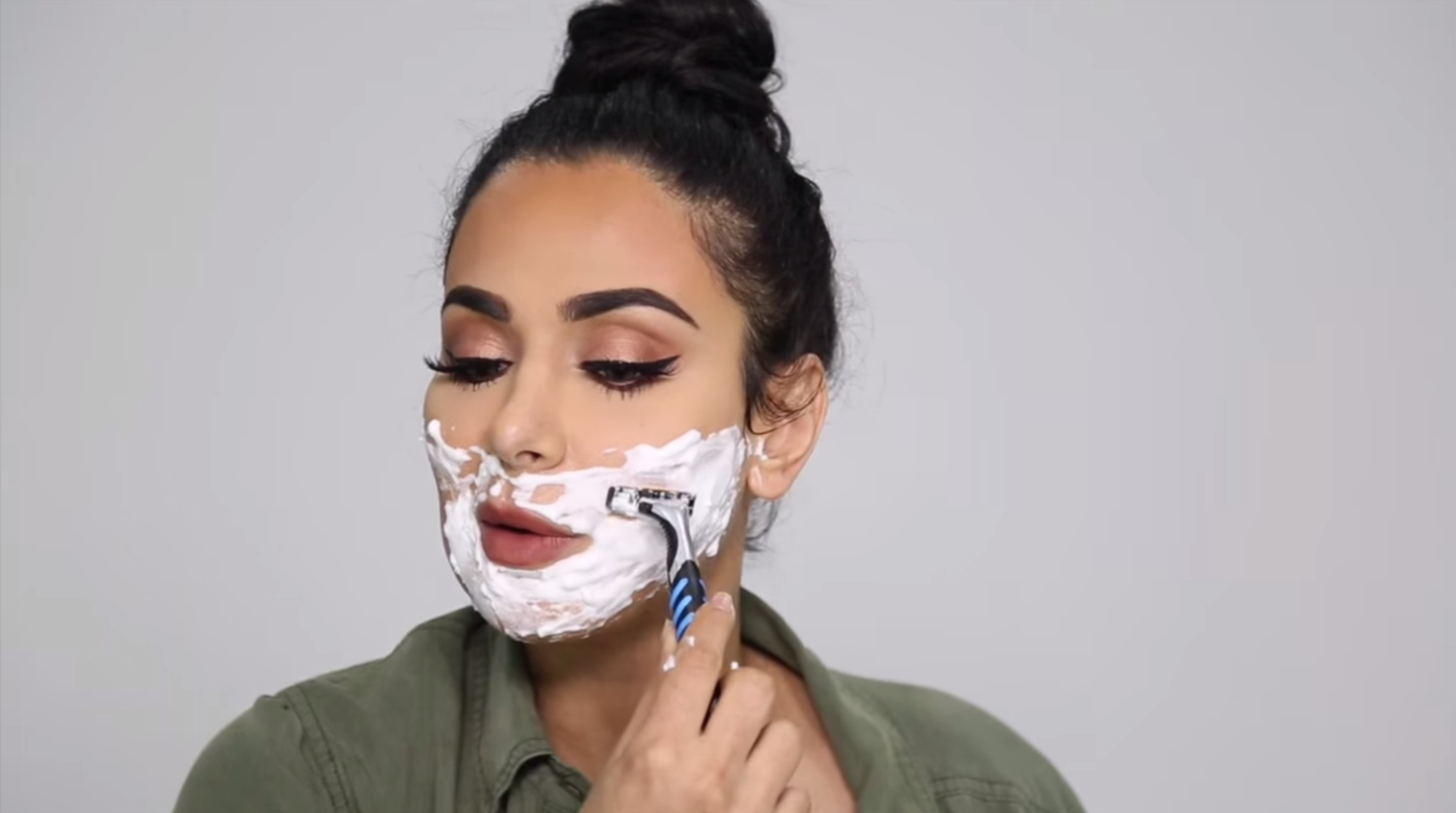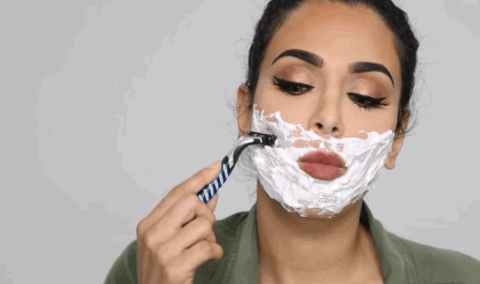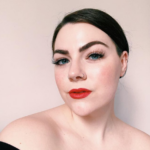
Shaving and other methods of body hair removal are such integral parts of most women's daily routines. Shaving products for our legs are being marketed to us almost 24 hours a freaking day! But when it comes to having and removing hair on our faces, TV, movies, advertising, and other media outlets remain pretty hush-hush — as if it's impossible for women to have facial hair to begin with.
But we do! Women might not grow beards on the regular, but we can experience peach fuzz and minor hair growth along our jawlines and chins. Some women, such as myself, experience hair growth to the point that they need to shave their faces frequently. I've been shaving myself almost every single day for two years, and until recently, I was so embarrassed by it that I didn't even want my best friends who live and share a bathroom with me to know.
Needing to shave made me feel less feminine, but the habit brought me to discover a life-altering fact about my body. If you shave and are ashamed of it like I was, or have wanted to shave your face but are afraid of the stigma, listen up.
I probably started shaving my face here and there right after getting an undercut for the first time in 2015.
At that point it didn't even occur to me that I had any facial hair, but after having the bottom and sides of my head shaved, it occurred to me that I actually had some dark peach fuzz-type hair in front of my ears and along my jawline that could no longer be hidden by the long hair that was covering those areas.
When I shaved that hair off, it barely grew back. I shaved only once a week and found the regrowth to be more or less the same every time.
Then, seemingly out of nowhere around mid-2017, the hair on my face became darker, more coarse, and began growing back much faster.
I didn't have a full-on beard, of course, but I did start getting visible, dark stubble around my jawline and on my neck. That's when I took to shaving my face basically any morning I knew I was going to be seen by people or wear makeup (ahem, every day except Sunday).
I thought this was due to the shaving itself because of a well-known myth that hair grows back darker and thicker once it's been shaved off. I knew from a selection of influencers who shave that the myth wasn't true, yet I still felt like I was "failing" as a woman for having so much facial hair and somehow not knowing how to get rid of it.
But then a visit to a new gynecologist that summer revealed the reason my facial hair was mysteriously so much more severe than other women's.
I booked a gynecology appointment for the first time in years simply to have all my bits examined and get a birth control prescription — but during my breast exam, my doctor specifically commented on some hairs on my nipple and asked if I usually have a lot of hair growth on my body and face. I said yes, so she suggested testing my testosterone levels.
A couple weeks later she called to tell me that I have polycystic ovary syndrome (PCOS).
PCOS, or polycystic ovary syndrome, is a hormonal disorder that affects more than just my ovaries.
People who have PCOS usually experience inconsistent or late periods, acne, heightened levels of male hormones, and — you guessed it — increased facial and body hair growth.
Though being told I have a disorder that could result in infertility, miscarriage, diabetes, depression, sleep apnea, or even endometrial cancer later in my life was utterly horrifying, it was a major relief to finally have a grasp on why my body hair was acting the way it was (and a lot of other things about my body too).
After that first appointment in 2017, my doctor prescribed a specific birth control pill that could somewhat put my hormone levels in balance. It decreased some of my body hair growth, but not enough to significantly eliminate my facial hair.
A couple weeks ago, after another checkup, she put me on spirnolactone, a medication used specifically to treat abnormally high male hormone levels and high blood pressure. I haven't been taking it for long enough to see results, but she insisted that "dermatologists love it."
Knowing that my body hair's severity was due to a disorder that I could partly control actually helped me embrace it.
As women, we're expected to be prim, perfect, and hairless at all times, but the at-times gross and embarrassing tactics we use to remain that way always get swept under the rug in TV and movies. And thanks to tons of bearded lady tropes and other insulting media stereotypes that poke fun at women who are more masculine than deemed "normal," I'd long felt that needing to shave my facial hair somehow made me less of a woman — or that my excess of face and body hair was somehow my fault.
But my PCOS diagnosis finally — and this might sound bad — gave me the scapegoat I needed. There's a reason I need to shave, and it's totally OK that I have to. My doctor told me so. It's not as uncommon as I'd been made to believe.
And though I always felt a little embarrassed that I even need to shave my face, it's honestly done wonders for my skin.
Shaving obviously removes all the unwanted hair from my face, but it's also an underrated form of exfoliation. My favorite thing to do right before a big night out is to shave my face. It smooths everything out before my skin care, and my makeup sits about 1,000% better afterward.
So I'm going to start picking up my face razor in the morning with pride — because I'm certainly not the only woman who does it.

Roughly 5 million women across the globe have PCOS — and it's not the only reason women grow facial hair. Gland abnormalities, certain medications, and general hormonal imbalances can cause women to grow facial hair.
So if you are like me and are wondering why the hell you need to shave so often, don't be ashamed of it! You're definitely not alone. You should, however, contact your doctor. Your shaving habits might uncover something much bigger.




